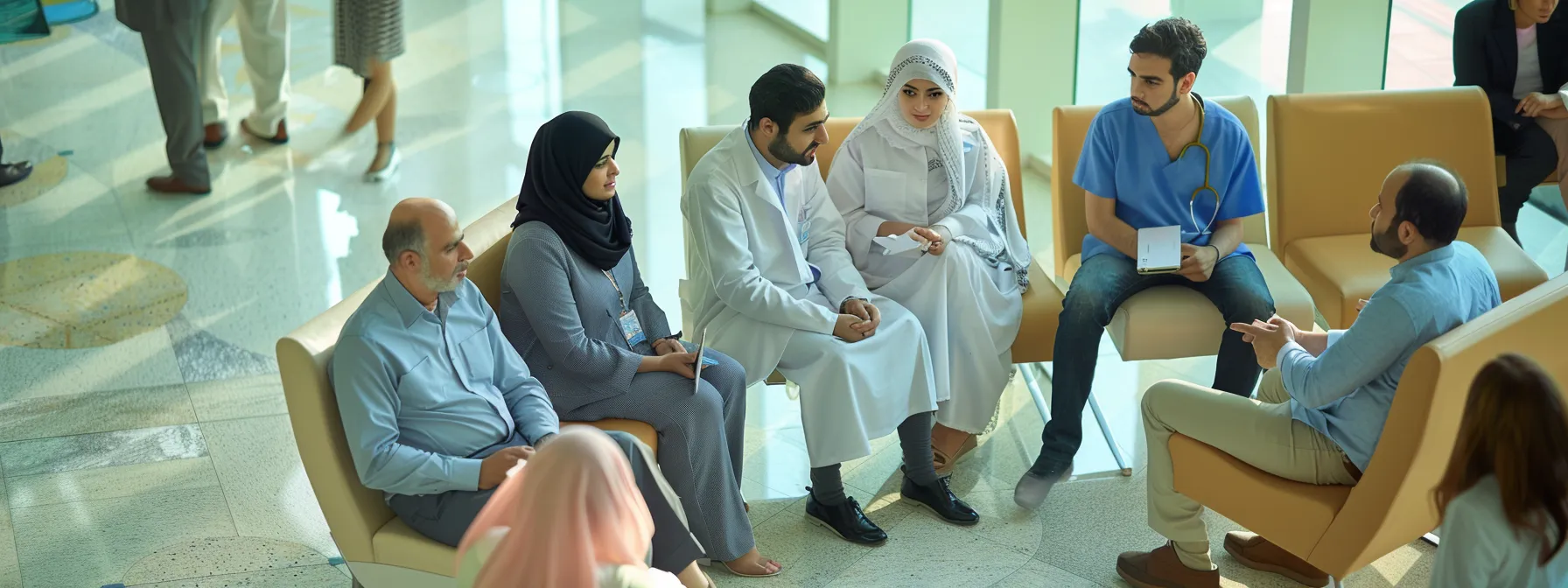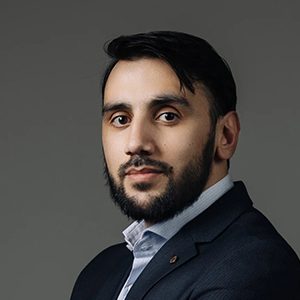Table Of Contents:
- Comprehensive Guide to Navigating Health Insurance and Medical Services in the UAE
- Understanding the UAE Healthcare System
- Overview of Public and Private Healthcare Sectors
- Key Regulatory Bodies and Their Roles
- Recent Developments in UAE Healthcare Policies
- Securing Health Insurance in the UAE
- Mandatory Health Insurance Requirements
- Choosing Between Local and International Insurance Providers
- Steps to Enroll in a Health Insurance Plan
- Understanding Policy Terms and Coverage Limits
- Navigating Medical Services in Dubai and Other Emirates
- Finding Accredited Medical Facilities
- Accessing Specialized Medical Care
- Utilizing Emergency Medical Services
- Leveraging Telemedicine and Digital Health Resources
- Maximizing Benefits From Medical Insurance in the UAE
- Understanding in-Network and Out-of-Network Providers
- Filing Insurance Claims Efficiently
- Cost-Saving Tips for Healthcare Services
- Preventive Care and Wellness Programs Covered by Insurance
- Healthcare for Expats and Visitors in the UAE
- Special Considerations for Non-Residents
- Short-Term Health Insurance Options
- Translating Medical Records and Language Support
- Cultural Sensitivity in Healthcare Settings
- Planning Ahead: Future Trends in UAE Healthcare
- Advances in Medical Technology and Treatments
- Upcoming Changes in Health Insurance Regulations
- Opportunities for Personalized Healthcare Services
- Conclusion
Did you know that the UAE healthcare system features facilities accredited by the Joint Commission International, signifying a global benchmark in healthcare quality? In this guide, we’ll delve into securing health insurance in the UAE and maneuvering through medical services in Dubai, Ajman, and beyond. You’ll learn how to maximize the benefits from your medical insurance, ensuring vital procedures such as organ transplantation are within reach, and understand primary health care advancements. We will address the complexities expats and visitors face and offer actionable solutions. Join me as we demystify the intricacies of navigating health insurance and medical services in the UAE, empowering you with knowledge for making informed decisions.
Understanding the UAE Healthcare System
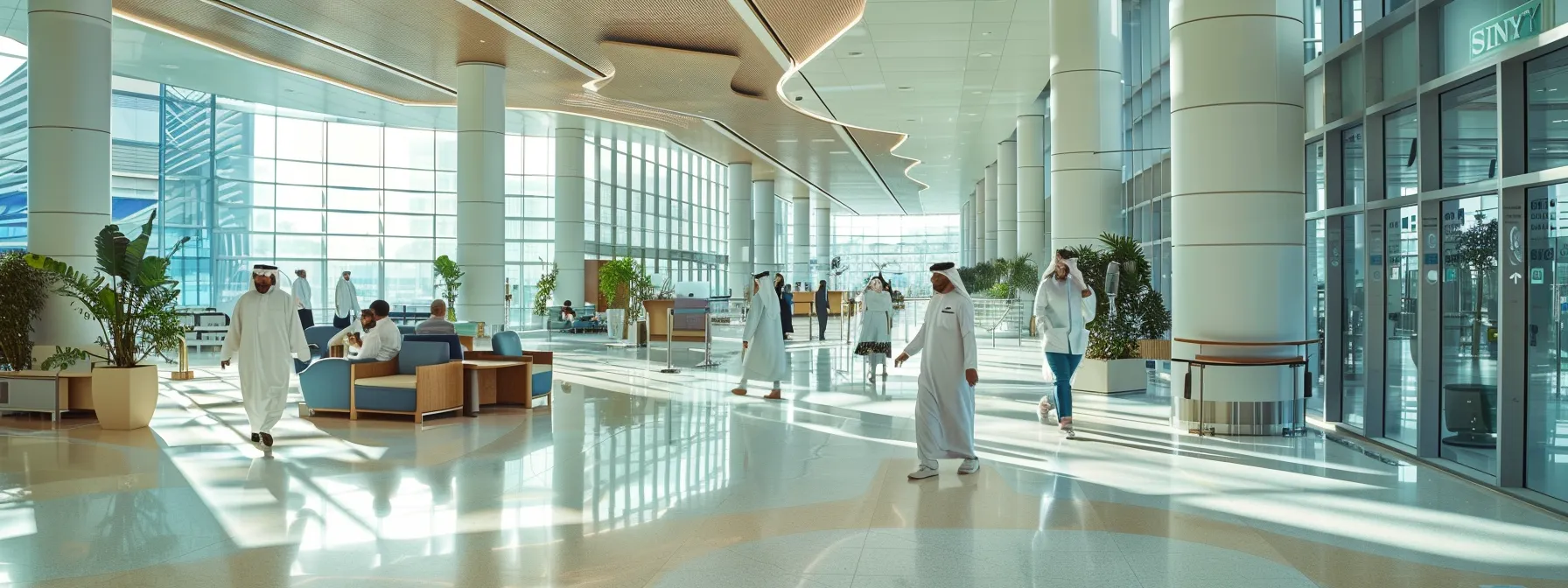
As an expert in the sector, I can attest that navigating the intricate realms of health insurance and the provisions for medical services is crucial for any resident or visitor in the UAE. In this section, we’ll delve into the dichotomy of public and private healthcare sectors, the pivotal roles played by key regulatory bodies, and the recent strides made in healthcare policies within the Emirates, particularly focusing on diabetes management, the emirate of Dubai, Explore Dubai Properties and education. This practical overview will prime you for the more detailed insights to follow, ensuring you understand the healthcare landscape of Dubai and beyond.
Overview of Public and Private Healthcare Sectors
With my extensive knowledge in real estate and Real Estate Insights, drawing comparisons with the UAE’s healthcare landscape is insightful. Both sectors, whether in healthcare or property, operate on a foundational dichotomy: the public and private realms. In the UAE, the public healthcare sector is supported by government resources and primarily caters to nationals, providing accessible services across various medical fields including midwifery and gastroenterology. Conversely, the private sector, often fueled by advanced biotechnology and investments, offers a competitive edge with specialized services for both expatriates and Emiratis.
I’ve assisted numerous clients looking to settle near top-tier medical facilities, and I’ve noticed the increasing role of biotechnology in transforming the private healthcare sector. Cutting-edge treatments and innovative research in fields like gastroenterology are not only making the Emirates a hub for medical tourism but are also decisive factors for residents prioritizing healthcare. Access to these Real Estate Insights resources shapes the decision-making process for many who seek a balance between location, amenities, and the assurance of quality health services.
Understanding the intricacies of each healthcare sector in the UAE is vital, much like the attention to detail required in successful real estate transactions. When considering healthcare, looking at the holistic offering from public initiatives to private health ventures is key. As a real special estate expert, I’ve noted the growing importance of proximity to reputable healthcare institutions, particularly for families and the elderly. This awareness is a resource for potential residents as they evaluate their living arrangements within an emirate, highlighting the interconnectedness between healthcare accessibility and real estate decision-making. Explore Dubai Properties
Key Regulatory Bodies and Their Roles
As a real estate professional who understands the importance of healthcare amenities, I’ve observed the critical role of the Dubai Health Authority (DHA) and the Ministry of Health and Prevention (MoHAP). These bodies are charged with regulating medical services, ensuring that the quality of care for conditions like stroke or vision issues such as floater is up to international standards. For example, MoHAP’s stringent policies on medication registration help residents and visitors in the UAE to access safe and effective drugs. For more real estate insights, Explore Dubai Properties and Contact Step Dream Estate.
In my interactions with clients from Ireland and other countries, I’ve noted their concern about adapting to a new healthcare system, especially for those managing chronic conditions. The Health Authority – Abu Dhabi (HAAD) serves as a beacon, ensuring healthcare providers adhere to the best practices—a relief for Arabs and expatriates alike who seek consistent Real Estate Insights and high-quality medical care across the Emirates.
It’s also become evident that the role of these regulatory bodies goes beyond oversight; they are instrumental in advancing healthcare innovation and Real Estate Insights. They champion projects to improve patient outcomes and healthcare delivery systems, a reassuring factor for clients who prioritize access to advanced medical services when purchasing property. By fostering an environment that prioritizes superior healthcare at Explore Dubai Properties, they inadvertently enhance the surrounding real estate’s appeal.
Recent Developments in UAE Healthcare Policies
Reflecting upon the evolving healthcare framework in the UAE, I recognize remarkable progress in policies that directly impact the expatriate experience. The adjustment to the insurance landscape has been notable, with the government mandating coverage for pre-existing conditions—Explore Dubai Properties a relief for many new arrivals concerned about comprehensive care. Focusing on the sustainability of healthcare, authorities are actively reforming supply chain processes to ensure the uninterrupted availability of essential medical supplies.
Another leap forward has materialized in the approach to substance abuse, as recent initiatives have shifted the narrative from punitive measures to a more empathetic rehabilitation focus. This paradigm shift aligns with the broader vision of the Arab world to promote entrepreneurship and innovation in healthcare, enabling the introduction of dedicated facilities offering specialized treatment programs Explore Dubai Properties and support systems for those affected.
My professional engagement with clients from diverse backgrounds has allowed me to witness firsthand the impact of these policy changes. The enhanced healthcare legislations are not only serving the medical needs of the community but also fostering a healthier environment that supports entrepreneurship and comprehensive healthcare for expatriates and nationals alike. Explore Dubai Properties Such strides exhibit the UAE‘s commitment to nurturing a robust healthcare system that is both inclusive and forward-thinking.
Securing Health Insurance in the UAE

As we dive into the process of securing health insurance in the UAE, it’s important to understand mandatory health insurance requirements that protect stakeholders, ensure efficiency in service delivery, and offer peace of mind. Deciding between local and international insurance providers, knowing how to choose the right plan, and understanding policy terms, such as coverage limits, are vital steps for anyone residing in places like Al Ain or Dubai, Explore Dubai Properties. Each family’s health insurance needs are unique, and my role is to guide you through enrolling in a plan that fits these needs perfectly. Following this, you’ll gain a comprehensive understanding of how to navigate the complexities of health insurance policies.
Mandatory Health Insurance Requirements
In my experience as a real estate expert who deals regularly with new residents, understanding the UAE‘s mandatory health insurance regulations is crucial for a smooth transition. Every emirate mandates that residents have proper health insurance coverage, which in turn necessitates that all registered Real Estate Insights facilities and providers comply with the local Health Authority’s standards. For instance, in case of an accident, an insured individual’s treatment process and the use of health technology are streamlined, providing much-needed assurance.
From the documents needed to visit a clinic to the intricacies of insurance packages, I guide my clients through every step. It’s pivotal to comprehend that employers in the UAE are generally required to provide health insurance for their employees, ensuring access to essential medical services. This inclusive approach is fundamental for protecting the health and well-being of residents, which in turn, fortifies the community’s trust in the region’s healthcare infrastructure. For Real Estate Insights on Burj Khalifa Luxury Estates, consider Explore Dubai Properties and Contact Step Dream Estate.
During client consultations, I highlight that while healthcare policies allow for standardized clinical trial practices and emergency service provisions, personal preferences might necessitate supplementary insurance. It’s advised to carefully analyze the terms and conditions of insurance policies; uninsured treatments can lead to unforeseen expenses. Navigating this landscape may seem daunting, but with proper guidance, one can avoid the pitfalls and secure coverage that aligns with their personal and professional circumstances.
Choosing Between Local and International Insurance Providers
When advising clients on whether to choose local or international health insurance providers, I emphasize the importance of aligning coverage with lifestyle needs. For individuals who frequently travel outside the UAE for business or leisure, opting for an international provider can ensure that they have comprehensive coverage during trips abroad. This is a vital consideration, especially for those involved in tourism in the United Arab Emirates, as it allows for seamless access to medical services whether at home or traveling.
The advent of telemedicine and remote patient monitoring is revolutionizing healthcare accessibility for my clients. Local insurers increasingly enable these services, which can be a determining factor for expatriates and locals working remotely or those managing chronic conditions. Choosing an insurance provider that offers such innovative solutions is integral to maintaining uninterrupted healthcare support.
In my role, I often facilitate clients in obtaining a free quote from various insurers to compare the benefits and costs rigorously. Accessibility to a broad network of hospitals and clinics within the Emirates is a priority for many residents, and local providers tend to boast expansive coverage in this regard. Therefore, I guide them towards the options that best suit their residency patterns and healthcare needs, ensuring they are fully informed in making this critical decision.
Steps to Enroll in a Health Insurance Plan
Enrolling in a health insurance plan in the UAE begins with assessing the medical network of potential insurers, something I frequently help my clients navigate. For those considering residing near Dubai Healthcare City, a comprehensive evaluation of the insurers’ affiliations with specialized medical facilities and practitioners in this renowned medical hub is fundamental. As an important asset for securing seamless healthcare services, it’s crucial to ensure that your preferred doctors and hospitals are covered by the insurance network, thereby aligning with the culture of tailored healthcare provision in the region.
Dedicating time to gathering and analyzing data is a key step I recommend in the enrollment process. Using quantitative insights, much like data science aids in decision-making, can determine your optimal coverage level based on variables such as income, lifestyle, and gross domestic product per capita. This methodical approach not only secures a financial safeguard but also contributes to an informed decision nuanced by economic factors and personal health needs.
The final phase involves a detailed review of policy documents, a practice I regard as equivalent to due diligence in real estate transactions. Scrutinizing terms and conditions, understanding limits on coverage, and acknowledging the fine print regarding pre-existing conditions ensures that the health insurance asset you acquire is robust and meets your expectations. Knowledge of UAE‘s regulations, coupled with a thorough evaluation, enables you to embark on your healthcare journey with confidence and clarity.
Understanding Policy Terms and Coverage Limits
In my professional dealings with health insurance in the UAE, I’ve learned the significance of thoroughly understanding policy terms, particularly concerning primary care. The descriptions provided by your insurance plan for co-pays, deductibles, and out-of-pocket maximums will determine your financial responsibilities. It’s essential to recognize these elements beforehand to avoid surprise expenses, ensuring you can access primary care services efficiently and affordably.
Healthcare innovation plays a critical role in the types of coverage provided by insurance policies. Emulating organizations in the United States, some insurers in the UAE now cover advanced telehealth services, enhancing convenience for policyholders. As a real estate expert, I advise clients to seek out plans that include such innovative care options, offering them flexibility and cutting-edge medical solutions.
Finally, the area of pharmaceuticals, or ‘drug‘ coverage, is an aspect of health insurance that shouldn’t be overlooked. It’s critical to confirm whether your policy includes the medications you may require, as some plans may have limitations or exclusions. Through firsthand experience, I’ve observed that understanding these details empowers individuals to select a health insurance plan that aligns seamlessly with their medical needs and lifestyle preferences.
Navigating Medical Services in Dubai and Other Emirates
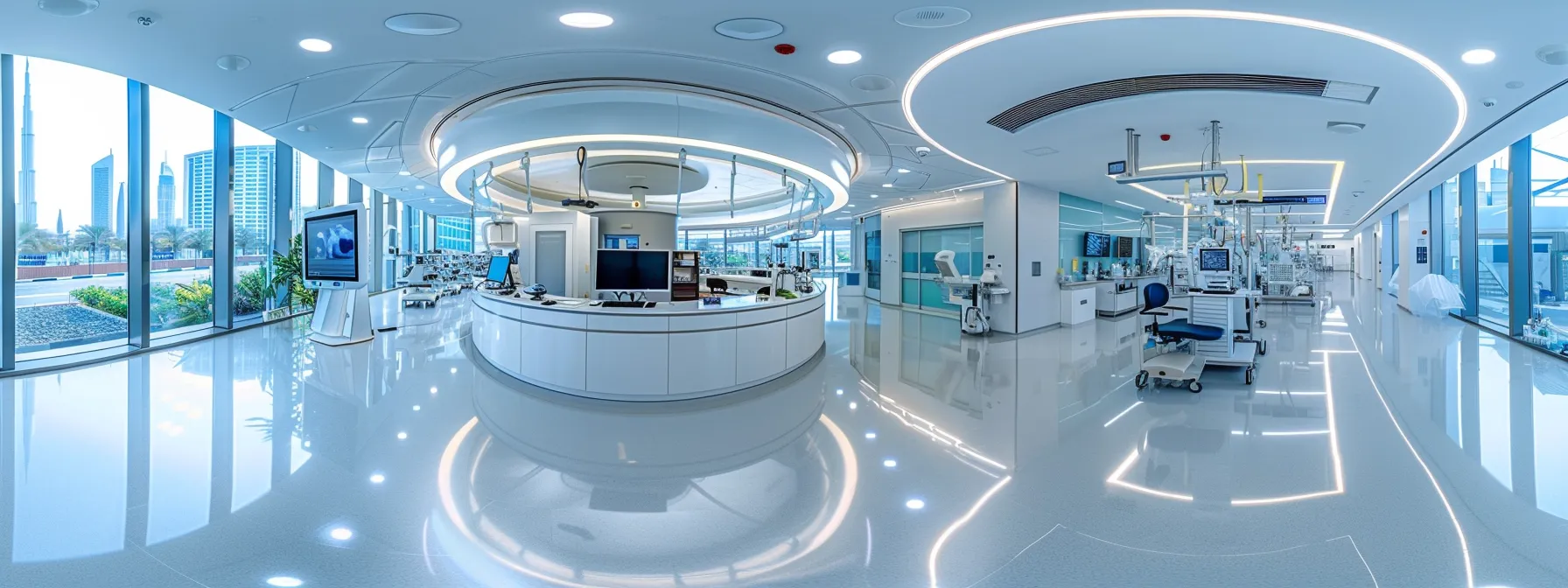
As an expert closely involved with the real estate market and its intersection with health amenities, I recognize the critical importance of familiarizing oneself with the medical services landscape in Dubai and other Emirates. The efficient identification of accredited medical facilities underpins the strength of our healthcare system, which is a cornerstone of both our economy and the well-being of our residents. Access to specialized medical care, prompt use of emergency services, and the burgeoning resources of telemedicine and digital health define the practical arena of healthcare services. Each of these factors contributes to the realization of universal health care, allowing individuals to navigate health-related challenges effectively. These resources, alongside the judicious use of medical devices, support families—including mothers and their children—in maintaining robust health, an aspect integral to the thriving society we continue to build here.
Finding Accredited Medical Facilities
In my role as a real estate advisor, I’ve helped families prioritize their healthcare needs by guiding them towards accredited medical facilities in Dubai and the wider UAE. It’s imperative for residents and expatriates to ensure that their chosen health care providers are recognized by their insurance policy to avoid unnecessary complications. I always recommend verifying the hospital or clinic‘s accreditation status with the Dubai Health Authority (DHA) to guarantee the highest standard of care, which is particularly crucial when caring for more vulnerable family members such as infants.
Securing health insurance health coverage that supports a wide network of accredited facilities can shape your experience and access to quality care. I advise reviewing your policy details thoroughly to confirm the inclusion of esteemed institutions, as this can significantly affect your peace of mind and medical service access. Your insurance should bridge the gap between needs and services, allowing for a smoother navigation through the health care Dubai landscape.
From firsthand experience, I’ve observed that ensuring your insurance plan matches the caliber of the desired medical service is essential, especially for specialized treatments. I emphasize to my clients the importance of an insurance policy which covers a range of accredited hospitals and clinics to maintain flexibility and choice. This foresight is particularly important for expatriates who might be more accustomed to the health care systems in their home countries and are seeking similar standards in the UAE.
Accessing Specialized Medical Care
In my experience helping clients with medical insurance in the UAE, I’ve noticed the importance of knowing local laws that affect access to specialized medical care. For instance, in Ras Al Khaimah and other emirates, the prevalence of certain healthcare facilities might vary due to the natural environment and population size. Hence, ensuring your medical insurance policy covers specialized care compliant with local regulations is both insightful and practical.
The landscape of medical insurance in the UAE has evolved, offering more comprehensive access to specialized medical care. I have become acquainted with many patients who have benefited from insurance plans that offer extensive networks, which include leading specialists and state-of-the-art hospitals across the Emirates, ensuring their unique healthcare needs are met within the framework of UAE law.
Understanding the intricacies of medical insurance in the UAE, particularly when seeking specialized care, can often be overwhelming. I guide my clients through selecting policies that guarantee coverage for the full spectrum of services they might need, emphasizing that a well-chosen insurance plan can navigate the complexities of healthcare access amidst the dynamic backdrop of UAE‘s natural and legislative environment.
Utilizing Emergency Medical Services
In my professional practice, I’ve observed that having a comprehensive plan is crucial when assessing the risk of emergency situations. In Dubai and across other Emirates, such plans must integrate smoothly with emergency medical services, ensuring rapid response and appropriate treatment. This includes everything from trauma care to complex procedures like orthodontics, where timely access to specialist care can significantly influence outcomes.
Advancements in data sharing within the UAE’s medical network have greatly improved the efficiency of emergency services. I guide my clients to ensure their insurance plans include provisions for seamless data sharing, as this can expedite emergency care delivery, aligning with their lifestyle and reducing the risk of treatment delays.
From my perspective, aligning your health insurance with the dynamic nature of emergency medical services in the UAE provides a solid foundation for peace of mind. It’s important to verify that your policy offers comprehensive plans that cover the full spectrum of potential emergencies, therefore mitigating risk and assuring continuity of care across the Emirates.
Leveraging Telemedicine and Digital Health Resources
In my experience advising clients in the vibrant city of Dubai, I have witnessed firsthand how telemedicine and digital health resources are transforming patient care. Within the emirate of Sharjah and its neighbors, such innovations are not just convenience; they’re a necessity for residents in less accessible areas, providing crucial links to medical advice and consultations. Telehealth has positioned the UAE as a leader in healthcare within the Gulf Cooperation Council, solidifying its status as a hub for medical research and digital innovation.
As Leader Healthcare Dubai continues to integrate advanced technologies, the benefits to patients are unmistakable. Remote monitoring tools and virtual health consultations offer a level of immediacy and convenience that was previously unattainable. This progress is essential in the UAE, where the demand for efficient and timely medical services is on the rise due to our expanding population and the dynamic nature of our society.
By embracing digital health resources, we can address barriers that patients often face when accessing care, such as mobility challenges or time constraints. Accessibility to telemedicine in the UAE has become particularly vital for those managing chronic conditions or requiring regular follow-ups. This adaptation to care not only reflects our commitment to innovation but also reinforces the UAE‘s position as a forward-looking member of the Gulf Cooperation Council, prioritizing patient-centric solutions.
Maximizing Benefits From Medical Insurance in the UAE
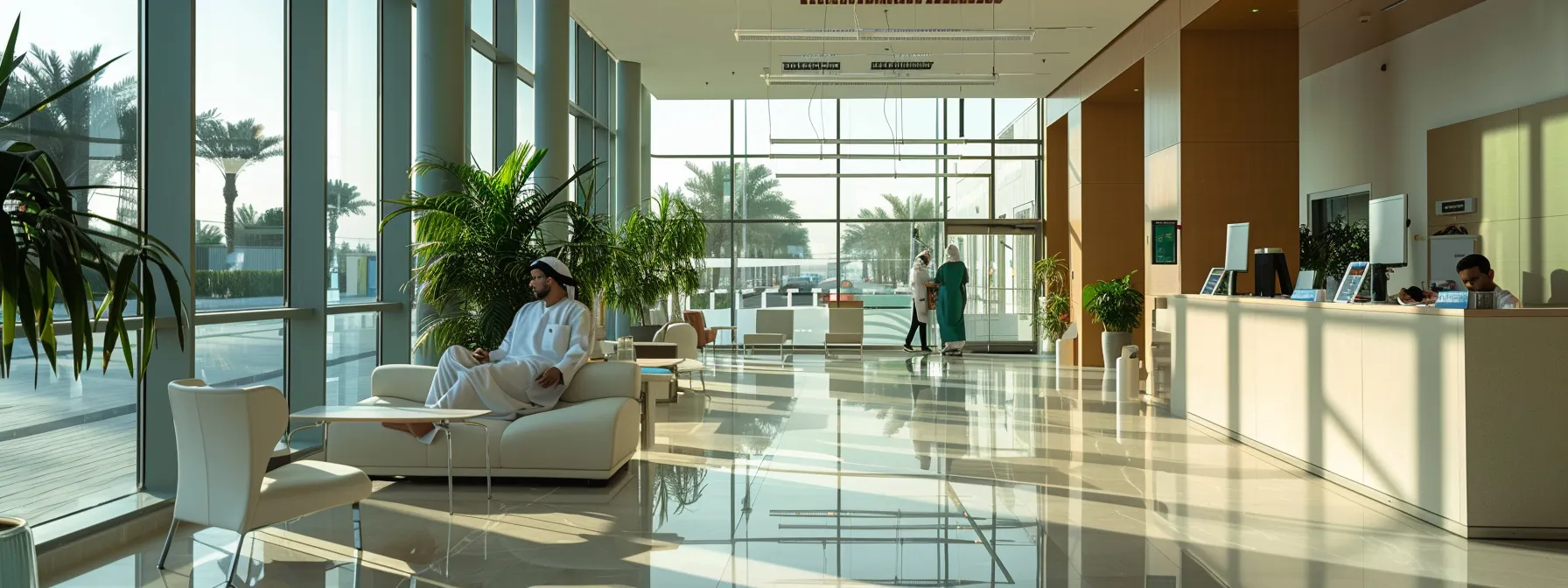
As we delve deeper into the essentials of health insurance in the UAE, it’s imperative to grasp how to maximize the benefits of your coverage. Understanding the distinction between in-network and out-of-network providers, filing insurance claims efficiently, and learning cost-saving tips can significantly impact your financial health. Additionally, exploring preventive care and wellness programs covered by insurance, especially in the face of pandemics, can enhance your overall well-being. My expertise will guide you through these pivotal areas, with a focus on critical illness insurance, adherence to regulation, and ways to efficiently handle healthcare expenses within different income tax brackets and lakhs of income. Let’s ensure you are well-equipped to extract the maximum value from your medical insurance plan in the Emirates.
Understanding in-Network and Out-of-Network Providers
In my advisory role, I emphasize the significance of understanding the infrastructure of in-network providers to my clients. Opting for in-network facilities that have a trusted partnership with your insurer can lead to greater cost savings and bolster patient safety. In Abu Dhabi and across the Middle East and North Africa, where the healthcare framework is intricate, choosing in-network providers ensures a seamless experience aligned with the high standards of local healthcare systems.
When I discuss health coverage with clients, I point out that using out-of-network providers may sometimes be necessary, but it invariably impacts the cost-benefit ratio of their insurance plans. It’s essential to assess whether the additional expense aligns with your needs for specialized services that may not be available within the network. Understanding this dynamic can prevent unexpected bills and enhance your overall experience with medical care in the UAE.
In guiding residents through the complexities of medical insurance, I’ve noticed an increased focus on infrastructure development enhancing patient safety at in-network facilities. Major cities in the UAE are expanding their healthcare networks, with Dubai and Abu Dhabi often leading the way. I ensure that clients are well-informed about their insurer’s network to guarantee that they have access to accredited facilities, which ultimately safeguards their health and financial well-being in the UAE.
Filing Insurance Claims Efficiently
As inflation impacts various sectors, including healthcare, I guide my clients through efficient claim filing to manage costs without compromising the standard of care. This begins with having a clear dialogue with your health professional to ensure all services rendered are accurately documented and aligned with your insurance policy‘s terms.
I’ve found having detailed records and promptly contacting your insurance via telephone or their digital platform can expedite claim processing. By taking proactive steps, such as understanding your policy‘s coverage and completing paperwork thoroughly, you can mitigate delays and ensure you’re not out-of-pocket for general services covered by your plan.
Clients often express concerns about navigating the complexities of claim filing; I reassure them by emphasizing the value of submitting claims correctly the first time. Verifying service dates and coding with your health professional prevents the common hiccups that can occur when insurers review your claims, maintaining a smooth process that respects both your time and financial resources.
Cost-Saving Tips for Healthcare Services
In my role, I’ve observed that staying informed about medicine prices can significantly curb your healthcare costs. By using analytics, patients can compare costs across different providers, ensuring they’re receiving the best value. This approach can help maintain low mortality rates by ensuring that individuals do not forgo necessary treatment due to cost concerns.
As a seasoned professional in the field, I encourage clients to keep abreast of the latest information on healthcare offerings. In a smart city like Dubai, many hospitals and clinics often have promotional health packages that combine several services at a reduced cost, which can lead to substantial savings over time.
I strongly advocate the use of preventive services that are covered by medical insurance, as this proactive measure can lead to significant long-term savings by reducing the risk of serious health issues. Engaging in routine check-ups and screenings allows for early detection of potential health problems, ultimately decreasing the chance of expensive treatments and hospitalizations.
Preventive Care and Wellness Programs Covered by Insurance
In my direct experience, I’ve seen how comprehensive health insurance plans in the UAE increasingly prioritize preventive care and wellness programs, providing much more than just reactive medical treatment. For example, Cigna, a global health service company with a strong presence in the UAE, often includes wellness initiatives like health screenings and vaccinations in their policies, encouraging individuals to take proactive steps in managing their health. Such offerings not only help to maintain a healthy population but also reduce the long-term cost burden on both patients and the healthcare system.
Furthermore, these health insurance plans are starting to embrace more specialized branches of medicine, such as ophthalmology, recognizing the importance of eye health in our digital age. By covering regular eye exams and treatments, insurers like those in partnership with Sheikh Khalifa Specialty Hospital, facilitate early detection of visual issues, thereby safeguarding individuals against preventable vision problems. Access to such specialized preventative measures is invaluable to the community, promoting overall well-being.
Moreover, the integration of technology, particularly through mobile apps, has been a game-changer in navigating preventive care services in the UAE. Insurance providers are swiftly adopting digital innovations, allowing policyholders to manage appointments and maintain health records conveniently. I’ve witnessed clients using these mobile apps to organize regular health check-ups, manage chronic conditions, and stay informed on their health metrics, all of which are increasingly important in our fast-paced lifestyles.
Healthcare for Expats and Visitors in the UAE

My guide for expatriates and travelers tackles the complexities of navigating health insurance and medical services in the UAE. Special considerations for non-residents, including short-term health insurance options and cultural sensitivity in healthcare settings, are paramount. Furthermore, I’ll address the translation of medical records and language support, ensuring expats receive accessible, quality care aligned with sustainable development goals. With my focus on practical insights for physicians, pediatrics, and the nuances of local health insurance, we take a step towards demystifying healthcare for all who come to the UAE.
Special Considerations for Non-Residents
Expatriates and visitors to the UAE should be aware that the private sector plays a significant role in providing healthcare services. As a real estate expert, I’ve seen clients who prioritize access to top-notch private facilities for specialized needs, such as CVS Health-provided services or cancer treatment centers renowned for medical research excellence. When choosing health insurance, it’s crucial to verify if these services align with your insurance network and are within reasonable proximity to your residence or place of visit.
In my professional engagements, I often remind non-residents to explore health plans that offer coverage for medical services driven by science and innovation, particularly in Dubai‘s dynamic healthcare landscape. These insurance policies can provide invaluable support for expats engaging in cutting-edge cancer treatments or participating in clinical trials, crucial elements in ensuring comprehensive care and peace of mind during your stay in the UAE.
I’ve guided clients through the complexities of securing health insurance that includes medical research facilities and advanced treatment options. It is essential for non-residents to prioritize policies that cater to their specific health needs, especially when seeking specialized care like CVS Health services or cancer treatment, ensuring that they can seamlessly access the best possible medical support during their time in the Emirates.
Short-Term Health Insurance Options
As a professional well-versed in the UAE‘s insurance market, I understand the necessity for expats and visitors to buy health insurance for short-term stays. Private health insurance options are available that cater specifically to the short-term needs, ensuring that the unexpected expense of a medical emergency does not become an overwhelming burden. These policies are designed to provide peace of mind, covering everything from urgent medical tests to hospital stays, without the commitment of a long-term plan.
I’ve advised clients on the optimal short-term coverage plans which minimize out-of-pocket expenses while providing comprehensive medical support. When selecting a short-term health insurance policy in the UAE, it is crucial to check that it covers the full spectrum of potential healthcare needs, including medical tests at accredited facilities. This approach ensures that you’re not caught off-guard by unforeseen medical costs.
In my experience, individuals visiting the UAE, either for tourism or business, frequently overlook the importance of securing health insurance. I always underscore the fact that healthcare costs without insurance can be substantial, which is why obtaining a flexible, cost-effective short-term private health insurance plan is a priority before arrival in the country. Tailored to fit the duration and scope of your visit, these plans offer protection against unexpected medical expenses, allowing you to enjoy your stay with assurance.
Translating Medical Records and Language Support
In my professional experience, the translation of medical records into English or Arabic is a vital component of health policy in the UAE aimed at improving productivity within the healthcare system. Language support services are often offered by hospitals and clinics to ensure that non-Arabic-speaking expats and visitors can make informed decisions about their care. As a result, patients can navigate medical services more efficiently, contributing positively to their overall health experience in the Emirates.
Having witnessed the transformative impact of information technology on healthcare, I understand the need for expatriates to have access to digital tools that facilitate the accurate translation of their medical records. This level of leadership in integrating technology enhances the collaboration between international healthcare providers and local laboratories. It ensures consistency in medical histories, which is crucial for maintaining a continuum of care when residing in or visiting the UAE.
Ensuring that all healthcare documentation is correctly translated and understood can be as significant as the treatment itself. I often advise clients seeking care in UAE‘s advanced medical laboratories and facilities to utilize translation services to avoid miscommunications that could impact their care. Such attention to linguistic detail is a testament to the UAE‘s commitment to providing an inclusive and accessible health environment for all, aligned with international best practices.
Cultural Sensitivity in Healthcare Settings
In my practice, I emphasize to expatriates the importance of understanding cultural norms, especially when it concerns consent within the UAE‘s healthcare system. With a diverse populace and a robust public sector, healthcare professionals are accustomed to handling sensitive issues like pregnancy with respect to cultural expectations. It is crucial for expats to familiarize themselves with these practices to navigate the medical landscape respectfully and without unnecessary cost or stress.
My experience with clients from various cultural backgrounds has illuminated the need for cultural sensitivity, particularly in contexts involving women’s health and family planning. Physicians in the UAE, often referenced in publications like PubMed Central, are well-versed in the cultural nuances that impact patient interactions and treatment plans. Acknowledging these subtleties can significantly enhance the patient-provider relationship, fostering trust and compliance.
I’ve advised many clients on the cost-effective benefits of understanding cultural practices in UAE healthcare settings. For instance, some traditional health beliefs may influence a patient‘s medical decisions, which, when respected, can lead to more effective care management and reduced unnecessary expenses. As professionals, showing cultural sensitivity not only supports adherence to the public sector‘s standards but also reflects a commitment to patient-centered care.
Planning Ahead: Future Trends in UAE Healthcare
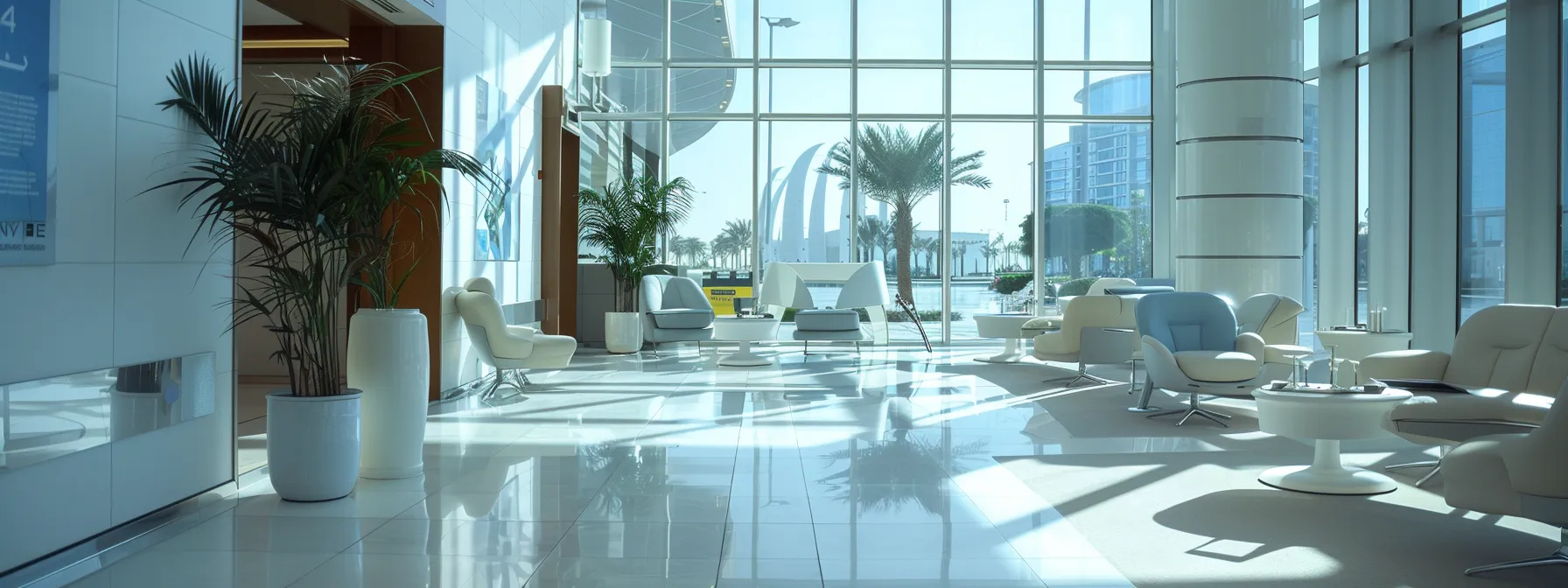
Looking to the horizon, I observe a landscape rich with innovation and adaptation in the healthcare sector of the UAE. Advances in medical technology and treatments continue to emerge, reshaping emergency services and specialized care. From the bustling confines of Dubai International Airport to the stretches of the Emirate of Abu Dhabi, a new wave of health insurance regulations is set to further refine the protection and assurance available to residents. Moreover, a burgeoning database of health information is carving out space for personalized healthcare services while placing a sharper focus on mental health provisions. Together, these elements are etching a future where healthcare in the UAE is not only pioneering but also intimately tailored to individual needs.
Advances in Medical Technology and Treatments
Advancements in medical technology are revolutionizing patient care in the UAE, with tools that provide sharp accuracy in disease diagnosis and manage infection rates with refined precision. In my experience, especially when advising on real estate near key healthcare hubs, clients are increasingly interested in properties that have access to cutting-edge facilities, where the latest technologies are actively reducing wait times and improving the quality of treatment in emergency departments.
As a professional closely monitoring trends in consumer health technology, I’ve observed that the initiatives led by visionaries like Mohammed bin Rashid Al Maktoum are fostering a surge in healthcare innovation. The emphasis on incorporating advanced technologies into medical practice places the UAE at the forefront of healthcare modernization, ensuring residents have access to the most advanced treatment protocols and medical devices available.
The UAE‘s commitment to enhancing medical services extends to the emergency department, where the adoption of sophisticated technology is vital for rapid response and effective treatment. Streamlining operations with tech-driven solutions not only improves patient outcomes but also assures consumers that the UAE’s healthcare system is equipped to handle urgent and complex medical scenarios with efficiency and expertise.
Upcoming Changes in Health Insurance Regulations
As I monitor the shifts in the UAE‘s healthcare sphere, I see potential regulatory changes that could influence insurance plans profoundly. With the nation’s focus on burgeoning sectors like citizenship through investment, it’s plausible that health insurance regulations might evolve to integrate with these new policies. For anyone with an eye on the future, staying informed about these possible amendments will be essential for strategically aligning healthcare decisions with investment plans.
Part of serving my clients involves understanding how overarching changes could impact their daily lives, like the prospect that clinic and vehicle insurance requirements may soon intersect. As these sectors potentially converge, there may be implications for the breadth of insurance plans available. My goal is to assist you in navigating these complexities, ensuring that you are well-prepared for any regulatory changes.
With the healthcare industry‘s trajectory, there’s anticipation around how insurance plans might adapt to accommodate advanced clinic treatments or innovative services. As these transformations unfold, rest assured that my guidance will reflect the latest in regulatory developments, enabling you to make informed decisions when it comes to your healthcare coverage in the UAE.
Opportunities for Personalized Healthcare Services
In the rapidly evolving market of UAE healthcare, personalized services are taking center stage. Aided by advancements recognized by the World Health Organization, care providers are now able to tailor treatments and wellness programs to individual genetic profiles, lifestyle habits, and health histories. As a real estate expert with an eye on health amenities, I’ve seen insurance plans increasingly accommodate these bespoke services, bridging the gap between standard care and personalized medical attention.
Having access to personalized healthcare is becoming a critical factor when setting a budget for health expenditures. Patients, now more than ever, can align their insurance plan with their unique health requirements, ensuring their premium reflects the tailored approach they receive. This specificity not just optimizes their healthcare outcomes but also provides cost-effective solutions by preventing unnecessary generic treatments.
The inclusion of personalized services in healthcare initiatives is a game changer, and I’ve noticed it being reflected in even the finest details such as Pubmed indexed research. With insurers adjusting policies to include personalized medicine, patients are better equipped to make informed decisions that prioritize their health needs while simultaneously demanding market competitiveness from providers. This facet of healthcare evolution is transforming the industry, influencing everything from patient care to insurance offerings.
Conclusion
Navigating health insurance and medical services in the UAE is crucial for ensuring accessible, high-quality care and financial security. Through careful selection of in-network providers, proper understanding of insurance terms, and efficient claim filing, residents can maximize their benefits and minimize costs. Emphasizing preventive care and embracing advancements in medical technology enhance the overall wellbeing of individuals and families. As the UAE‘s healthcare landscape evolves, staying informed and choosing the right coverage will remain paramount for both residents and visitors alike.
